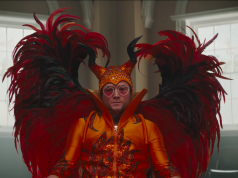You’ve probably heard about the show-stopping number in “Dreamgirls,” the one called “And I Am Telling You I’m Not Going,” the one in which “American Idol” non-winner Jennifer Hudson assures herself a place in the pantheon of legendary vocalists. Since I dislike movie-related hyperbole, I would love to tell you that Hudson’s talent has been overstated and that her performance of the song is nothing special. But in this case, the hype is accurate. Hudson’s rendition of the song — an angry, desperate, pitiful declaration of resolve — is astonishingly powerful. It’s one of the most breathtaking tours de force in the history of movie musicals.
The rest of the movie? Eh, it’s fine. Director Bill Condon, who wrote the screen version of “Chicago” a few years back, has adapted this 1982 Tony winner with vigor, and the costumes and production design are every bit as fabulous as the show demands. Condon, also the consummate director of “Kinsey” and “Gods and Monsters,” knows his way around biopics, musicals, and show business behind-the-scenes stories, all of which apply to “Dreamgirls.” Yet for all its glitter and razzle-dazzle, this film version rarely connects on an emotional level. It feels superficial — though I admit it’s a pretty rousing and toe-tapping kind of superficiality.
Originally written by composer Henry Krieger (who has penned a few new tunes for the film) and the late lyricist Tom Eyen, “Dreamgirls” is a thinly veiled retelling of Diana Ross and the Supremes’ career. In the fictional version, the Dreamettes are a Detroit trio — uptight Deena (Beyonce Knowles), shy Lorell (Anika Noni Rose), and diva-in-training Effie (Jennifer Hudson) — who catch their first break in the mid-1960s when an enterprising talent manager and part-time car salesman named Curtis Taylor (Jamie Foxx) books them as backup singers for womanizing R&B sensation James Early (Eddie Murphy).
Soon Curtis is moving the Dreamettes out on their own, with one adjustment: Though Effie has the strongest, most dynamic voice, she is also chubby and difficult to work with, so Curtis makes pretty and pliable Deena the lead singer and keeps Effie in the background, singing doo-wops with Lorell.
The second half of the film leaps into the mid-’70s. Deena and the Dreams are a huge hit, James Early has had all the funk and grunty energy sucked out of his act by his mainstream-minded manager Curtis, and Effie — who was ultimately kicked out of the Dreamettes altogether — is a single mother and a has-been, though poverty doesn’t seem to have burned away her fiery temper or demanding attitude. Deena and Curtis are married, with him still acting as her manager, a combination that can only lead to trouble. And Lorell has been carrying on an illicit affair with James Early (a married man) for years.
The film subtly combines show business with personal business, the love of the crowd mingled with the love of a good man. Characters say “It’s over” a lot, referring to relationships, business deals, love affairs, concert tours, or all of the above. When Effie insists, in that magnificent song, that it’s NOT over, she means it two ways: She refuses to be kicked out of the group, and she refuses to let Curtis break up with her. Ironically, for as explosively powerful as the song is, in the end it’s useless: It IS over, and she IS going, whether she likes it or not.
An evaluation of the ups and downs of a show business career is hardly new to “Dreamgirls,” having once been the foundation for dozens of Golden Age Hollywood musicals. But the fact that “Dreamgirls” is about an African-American group, with musical accompaniment to match, is noteworthy, and one of Condon’s minor changes in the stage-to-screen adaptation is to set the Dreamettes’ story against the backdrop of the Civil Rights movement.
That gives it a little more weight, but it’s still a glossy story with glossy characters. Effie is a fireball, sure, but Hudson’s greatest acting is in that one number; her performance the rest of the time has a raw, natural feel to it (it’s Hudson’s first time acting), but it’s nothing remarkable. Beyonce Knowles and Anika Noni Rose have done plenty of acting, but Knowles can’t shake her bland pop-star roots, and Rose’s character is secondary, too infrequently used to give her any chance to stand out.
I’ll tell you who I like, though: Eddie Murphy. After floundering in poop-joke-centered family films for the last decade, he’s found a role here that lets him be funny, thoughtful, charismatic, and adult. The full story of James Early, an R&B singer who sells out to the white man before staging a comeback, would be a nice companion piece to “Dreamgirls,” and Murphy spruces up every minute of the film that includes him.
Mostly, “Dreamgirls” is a relief. Broadway adaptations have had mixed success since “Chicago,” so at this point even a stand-up double feels like a home run, if you’ll pardon my use of a sports metaphor. “Dreamgirls” isn’t the revelation “Chicago” was — it’s neither as fun nor as catchy — but it’s a step in the right direction.
B (2 hrs., 11 min.; )





